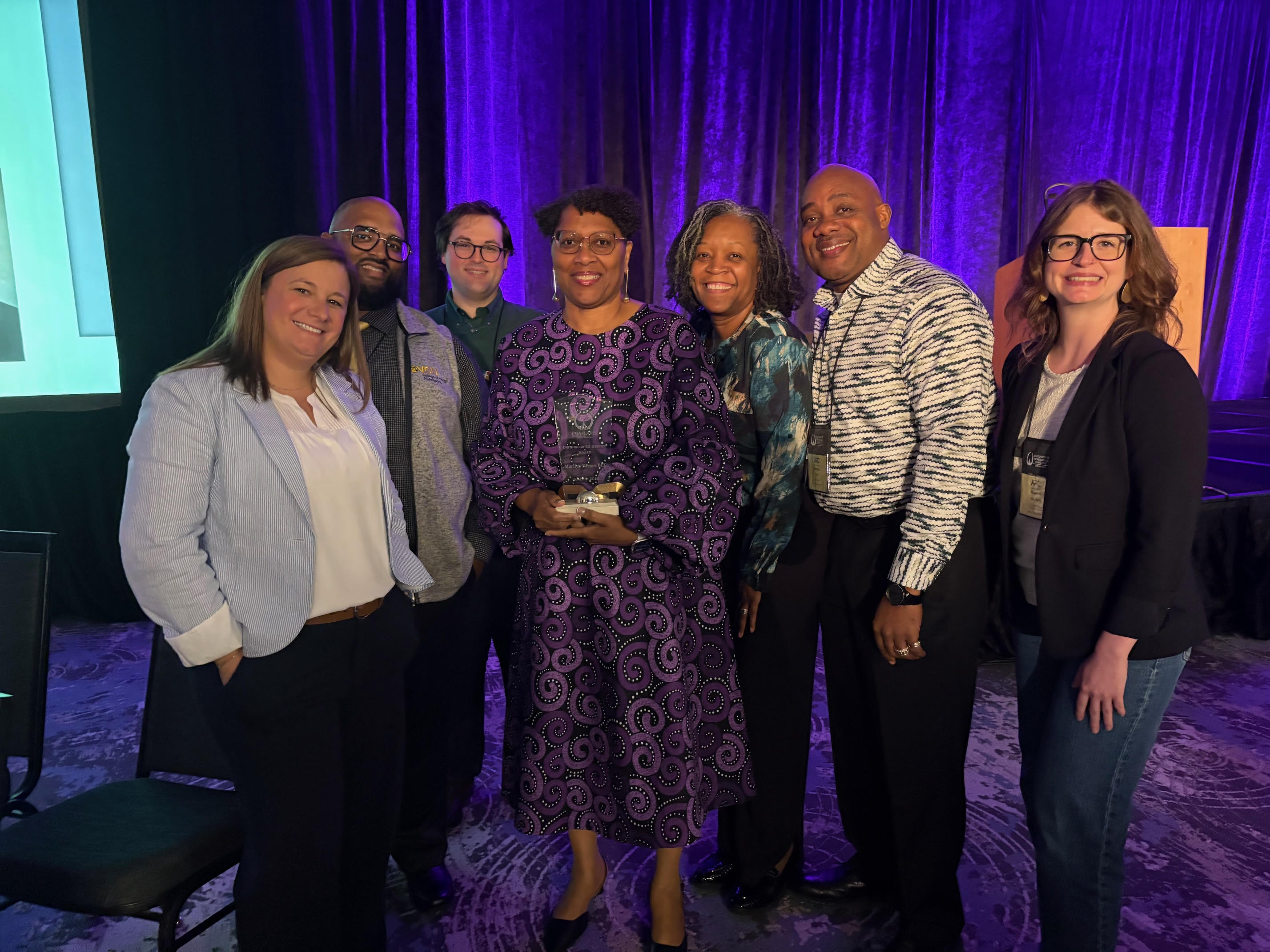The state of chaplaincy is strong at VCU
Few images conjure more solemnity than a room full of chaplains at an academic conference. But the 2025 Association of Professional Chaplains Annual Conference could have been mistaken for a basketball game at the Siegel Center every time VCU was mentioned.

“The motto for the conference, everywhere we went, was ‘Go Rams,’” said Kelsey White, Ph.D., assistant professor and chaplaincy faculty researcher at VCU’s Department of Patient Counseling in the College of Health Professions. Spiritual care and chaplain colleagues from other health systems would chant "Go Rams" whenever they saw VCU faculty around the conference.
Held in Minnesota this year, the annual conference drew chaplains, academics and other key figures in the field from across the country to share research and discuss the future of the profession. This year, VCU was represented by three prominent figures in chaplaincy research – Rev. Marilyn J.D. Barnes, Calvin Bradley Jr. and Kelsey White.
Barnes, Rev. Robert B. Lantz chair and associate professor of the Department of Patient Counseling, College of Health Professions and director of pastoral care at VCU Health, was presented with the 2025 Distinguished Service Award by the association.
“VCU has always been a leader for chaplaincy and spiritual care,” White said. “But this year, it became abundantly clear that VCU is at the forefront, and this is the place to come if you want to be part of that.”
Among the contributions, VCU’s team substantially contributed to the preconference State of the Science Symposium, hosted by Rush University’s “Transforming Chaplaincy” program on health and spiritual care. Held on June 12, 2025, the symposium featured work and engagement from cutting-edge chaplaincy researchers, including Barnes, Bradley and White.
“A lot of chaplains know that VCU is the only place in the country that can really give you both the robust clinical and academic experience when it comes to professional chaplaincy,” said White.
Bradley, the director of education and assistant professor in the Department of Patient Counseling, and president of the Pediatric Chaplains Network, said that he and White are key players in burgeoning chaplaincy research.
“Chaplaincy research and understanding the academic side of chaplaincy is extremely new,” Bradley said. “VCU leads the profession and Kelsey leads a lot of research that’s being done.”
During the symposium, White and Barnes presented their research on how to demonstrate the positive impacts of having a chaplain on staff in a health care setting to executives. “Chaplains, with their expertise and training,” said White, “are really improving the organization as a whole.”
Barnes was also an expert panelist for a group focused on conducting spiritual assessment, a process in which chaplains evaluate a patient’s spiritual needs, beliefs and hopes in a clinical context. Barnes is close to this topic – she helped develop a taxonomy for chaplains conducting spiritual assessments in 2013 that’s used by chaplains across the country and around the world.
She also presented on health care leadership with a national group of chaplaincy leaders.
“We talked about caring for our colleagues during mergers, acquisitions or workforce reductions, and the realities of leading during those times,” Barnes said.
Like any good group of educators, VCU’s team returned from the conference with more questions than answers.
Shaping chaplaincy’s future
VCU’s team wants to spread the knowledge gained from the conference to address pressing issues in chaplaincy.
“People are changing, which means we have to change our profession,” said Barnes.
“Nones” – American adults who identify as agnostic or atheist – make up 28% of U.S. adults, according to a 2024 study from Pew Research.
Barnes, Bradley and White point out that most people think chaplains are religiously affiliated and operate in a Judeo-Christian framework. They want to find ways to change this perception and provide care for more people.
“If I’m a None and I’m in crisis, I don’t want to hear about Jesus, because that’s not a connection for me,” said Barnes, who is an ordained Itinerant Elder in the African Methodist Episcopal Church. She added that as a chaplain, it’s imperative to meet patients where they are spiritually, and not project religious beliefs onto them.
“There are a lot of religious assumptions behind the field that can cause misunderstanding when it comes to what the wider world thinks about chaplains,” said White, who is a religious naturalist, which is someone who views their spirituality or religious orientation through a naturalist framework. “I’m not religious, and many people assume chaplains have to be religious.”
Widening the pathway to chaplaincy
Becoming a chaplain is a lengthy process that requires a college degree, seminary or divinity studies and board certification. The VCU team wants to make chaplaincy a more accessible profession.
“There are many people who would be great chaplains, but don’t need or want a theological degree,” said White.
Traditionally, Bradley noted, people moved into chaplaincy as a second career. Nowadays, many young people are moving from college directly into chaplaincy, and he wants to explore ways to support the new wave.
“How do we help those individuals have sustainable careers where they can build a pathway of growth throughout their career?” he said. “One of the many things we’re trying to do here at VCU is create pathways for people who come from backgrounds other than traditional Judeo-Christian backgrounds to be able to do this work.”
Ultimately, VCU’s team is focused on supporting students at VCU and growing the chaplaincy program.
“My focus is how we train students,” said Bradley. “We really pride ourselves on being able to integrate the things we learn from conferences into how we develop and train chaplains.”